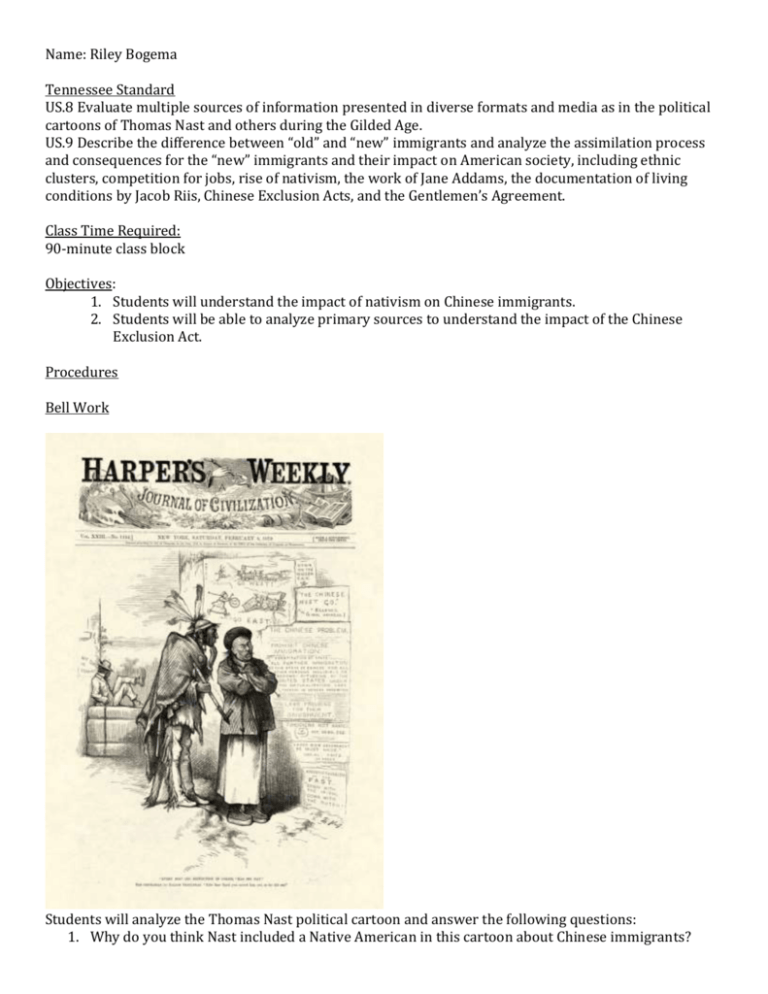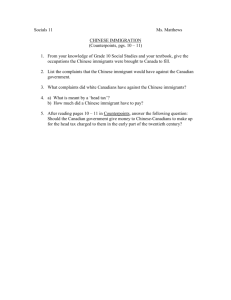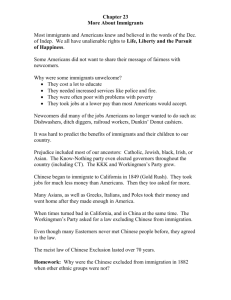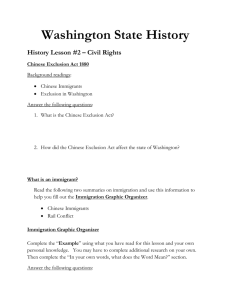Lesson Plan on the Chinese Exclusion Act
advertisement

Name: Riley Bogema Tennessee Standard US.8 Evaluate multiple sources of information presented in diverse formats and media as in the political cartoons of Thomas Nast and others during the Gilded Age. US.9 Describe the difference between “old” and “new” immigrants and analyze the assimilation process and consequences for the “new” immigrants and their impact on American society, including ethnic clusters, competition for jobs, rise of nativism, the work of Jane Addams, the documentation of living conditions by Jacob Riis, Chinese Exclusion Acts, and the Gentlemen’s Agreement. Class Time Required: 90-minute class block Objectives: 1. Students will understand the impact of nativism on Chinese immigrants. 2. Students will be able to analyze primary sources to understand the impact of the Chinese Exclusion Act. Procedures Bell Work Students will analyze the Thomas Nast political cartoon and answer the following questions: 1. Why do you think Nast included a Native American in this cartoon about Chinese immigrants? 2. What are some of the things written on the wall that the Chinese immigrant is looking at? How do they portray nativist views towards immigration? Class Work Students will be given the Chinese Exclusion Act (1882) document. In groups of 3-4 students they will answer the following document based questions: 1. What were the goals of the Chinese Exclusion Act? 2. Why do you think there is such large emphasis on excluding Chinese laborers from immigrating into the country? Students will then use a computer lab, or a set of laptop computers and visit the following site: http://www.calisphere.universityofcalifornia.edu/themed_collections/subtopic2a.html Using the site they will look at the set of primary source images and read the provided overview text. They will answer the following questions. 1. 2. 3. 4. How did the Chinese preserve their culture in American society? What did they do for work? How did some white Americans regard the Chinese? Which images do you think portray the roles of racism and nativism in American society the best? Why? Closing As an entire class discuss the reading. Have students share which images from the website impacted them the most or provoked the most discussion within their groups. Evaluation Read and grade the answers to the six questions. Student Handouts: Chinese Exclusion Act (1882) http://www.ourdocuments.gov/document_data/pdf/doc_047b.pdf Resources: Nast, T. (1879, February 8). Every dog (no distinction of color) has its day. Retrieved February 17, 2015, from http://arcweb.sos.state.or.us/pages/exhibits/1857/during/race2.htm Chinese Exclusion Act of 1882 Retrieved February 17, 2015 from http://www.ourdocuments.gov/document_data/pdf/doc_047b.pdf Calisphere: Chinese Exclusion Act Retrieved February 17, 2015 from http://www.calisphere.universityofcalifornia.edu/themed_collections/subtopic2a.html







